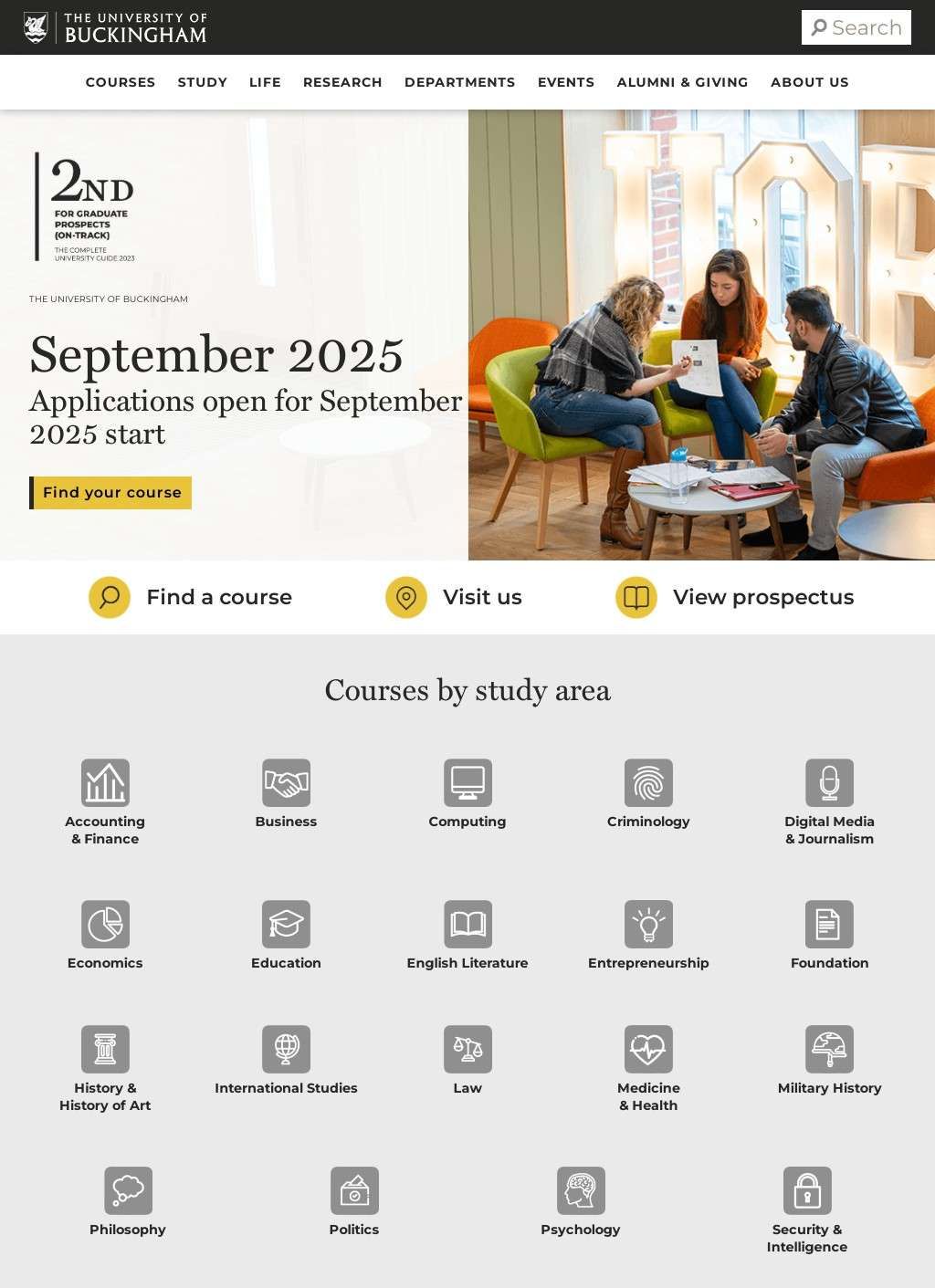The University of Buckingham holds a unique position in British higher education as the country's first private university, established in 1973 and receiving its Royal Charter in 1983. With approximately 3,300 students, Buckingham maintains an intimate educational environment radically different from larger institutions. The university pioneered the two-year accelerated honours degree, enabling students to complete undergraduate studies a full year earlier than traditional programs. This innovation reflects Buckingham's founding philosophy of challenging educational orthodoxy while maintaining rigorous academic standards through intensive study periods.
Small class sizes and personalized education define the Buckingham experience. With a student-to-staff ratio of 10.4:1, the university delivers Oxbridge-style tutorial teaching where professors know students by name. This approach enables deep intellectual engagement impossible in large lecture theaters. Tutorial groups foster critical thinking through direct dialogue between students and academics, creating an intellectually stimulating environment. The close-knit community extends beyond academics, with students from over 100 countries forming lasting international friendships. This global perspective enriches classroom discussions while building networks spanning continents.
Academic offerings span six schools covering Business, Humanities, Law, Science and Medicine, Computing, and Psychology. The Medical School, opened in 2015 as the UK's first private medical school, offers a 4.5-year MB ChB degree in partnership with Milton Keynes NHS Foundation Trust. This program received General Medical Council accreditation with commendation for excellent professional, academic, and pastoral support. Law programs leverage Buckingham's tutorial system particularly effectively, with many graduates progressing to prestigious chambers and firms. Business courses emphasize entrepreneurship, reflecting the university's independent ethos.
The riverside campus in Buckingham town center blends historic buildings with modern facilities across multiple sites. Hunter Street houses core facilities including Yeomanry House and the Anthony de Rothschild building containing Humanities departments. The restored Georgian Prebend House accommodates the Vice-Chancellor's office, while Tanlaw Mill provides social spaces including the main refectory. The imposing Chandos Building overlooks the river, housing the Medical School and largest lecture theater. Recent investments include the £8 million Vinson Building for Economics and Entrepreneurship, demonstrating ongoing campus development.
Financial independence distinguishes Buckingham from state-funded universities. Operating entirely on student fees and endowments without direct government funding via Office for Students or Research England, the university maintains complete autonomy over curriculum and governance. This independence enables rapid adaptation to changing educational needs without bureaucratic constraints. Students remain eligible for government loans through the Student Loans Company, ensuring accessibility despite private status. Scholarship programs support talented students, with particular emphasis on academic excellence.
International character permeates campus life, with over half of students coming from overseas. This diversity creates a genuinely global learning environment where cross-cultural understanding develops naturally through daily interaction. The International Office provides comprehensive support from application through graduation, including visa assistance and cultural orientation. Alumni networks span the globe, with graduates in senior positions across government, business, and professions worldwide. Notable alumni include politicians, business leaders, and creative professionals who credit Buckingham's unique environment for their success.
Research activities complement teaching excellence across various fields. The Centre for Security and Intelligence Studies has gained particular prominence, while the Centre for Education and Employment Research influences policy debates. Individual academics pursue specialized research, contributing to knowledge advancement while enriching their teaching. The university's size enables interdisciplinary collaboration difficult in larger institutions with rigid departmental boundaries. This research culture ensures teaching remains current with latest developments while providing students opportunities for research participation.
Challenges facing Buckingham include financial sustainability in an increasingly competitive higher education market. December 2022 saw the Office for Students fine the university for late publication of audited accounts, with auditors noting concerns about financial viability. The institution faces the delicate balance of maintaining small class sizes and personalized education while generating sufficient revenue. Competition from larger universities with greater resources requires Buckingham to clearly articulate its distinctive value proposition. Yet these challenges also drive innovation, forcing creative approaches to education delivery and student support that larger institutions might overlook.
Looking forward, Buckingham continues evolving while preserving core values of independence, excellence, and personal education. Plans for new programs respond to changing career landscapes while maintaining academic rigor. International partnerships expand global reach without compromising campus community intimacy. Technology enhances rather than replaces personal interaction, with online resources supplementing face-to-face tutorials. Through maintaining its pioneering spirit while adapting to contemporary needs, the University of Buckingham demonstrates that alternative models of higher education can thrive, offering students a genuinely distinctive educational experience that prepares them for global careers while fostering intellectual independence and critical thinking essential for future leaders.
